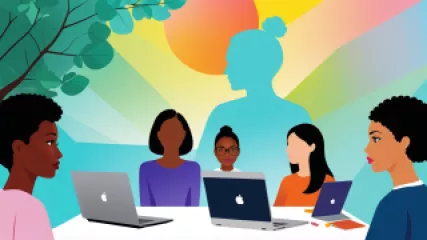The Impact of Psychoeducation on Mental Health: A Research Summary
Introduction
In recent years, psychoeducation has gained recognition as an effective approach in promoting mental wellness and providing support to individuals with mental health conditions. Psychoeducation encompasses a wide range of activities and interventions aimed at educating individuals about mental health, providing them with tools and resources to manage their symptoms, and fostering a sense of empowerment and self-care.
This research summary explores the impact of psychoeducation on mental health, drawing upon various studies and findings in the field. By delving into the benefits, challenges, and potential applications of psychoeducation, this article aims to shed light on the importance of integrating virtual psychoeducation classes and online psychoeducational tools into mental health support systems.
The Benefits of Psychoeducation
Psychoeducation offers several notable benefits for individuals experiencing mental health challenges. By providing education and information about mental health conditions, psychoeducation helps to reduce stigma, increase awareness, and empower individuals to take an active role in managing their own well-being.
1. Improved Awareness and Understanding: Psychoeducation equips individuals with knowledge about the signs, symptoms, and treatment options for various mental health conditions. This increased awareness allows individuals to recognize potential warning signs early on and seek appropriate support.
2. Enhanced Coping Skills: Psychoeducation provides individuals with practical strategies and coping skills to manage their symptoms effectively. These skills may include stress management techniques, problem-solving strategies, and emotion regulation methods.
3. Empowerment and Self-Advocacy: By fostering a sense of empowerment, psychoeducation encourages individuals to take an active role in their mental health care. It promotes self-advocacy and helps individuals communicate their needs to healthcare professionals, leading to more personalized and effective treatment plans.
4. Reduced Stigma: Psychoeducation plays a crucial role in reducing stigma surrounding mental health conditions. By providing accurate information and dispelling myths, it helps society develop a more compassionate and understanding attitude towards individuals with mental health challenges.
The Role of Virtual Psychoeducation Classes
In recent years, the advent of technology has facilitated the development of virtual psychoeducation classes, allowing individuals to access education and support from the comfort of their own homes. Virtual psychoeducation classes offer several advantages:
1. Accessibility: Virtual classes eliminate geographical barriers, making psychoeducation resources available to individuals regardless of their location. This is particularly beneficial for those residing in remote areas or facing mobility limitations.
2. Flexibility: Online platforms provide flexibility in terms of scheduling, enabling individuals to engage in psychoeducation at their convenience. This is especially valuable for individuals who have busy schedules or other commitments.
3. Privacy: Virtual psychoeducation classes offer a level of privacy that may be appealing to individuals who feel uncomfortable attending in-person sessions. This anonymity can encourage more open participation and discussion.
4. Cost-Effectiveness: Virtual classes often require fewer resources and overhead costs compared to traditional in-person sessions. This cost-effectiveness increases accessibility and allows for the expansion of psychoeducation programs.
Online Psychoeducational Tools
In addition to virtual classes, online psychoeducational tools play an essential role in supporting mental health and well-being. These tools provide individuals with interactive resources and self-help materials that can be accessed at any time. Some examples include:
1. Mental Health Apps: There are numerous mobile applications available that provide information, self-assessment tools, and guided exercises to support mental wellness. These apps can be easily accessed and used on smartphones or tablets.
2. Online Courses: Many reputable institutions offer online psychology courses that cover various aspects of mental health and psychoeducation. These courses provide individuals with the opportunity to deepen their knowledge and develop a better understanding of mental health conditions.
3. Web-Based Resources: Numerous websites and online platforms provide comprehensive information on mental health conditions, treatment options, and self-help strategies. These resources often include articles, videos, and interactive tools.
4. Virtual Counseling Sessions: Online therapy platforms offer the convenience of virtual counseling sessions, which can be particularly beneficial for individuals who find it difficult to attend in-person sessions due to various reasons such as geographical barriers or social anxiety.
The Future of Psychoeducation
As technology continues to advance, the future of psychoeducation holds immense potential for further innovation and growth. Virtual psychoeducation classes and online psychoeducational tools are likely to become increasingly integrated into mental health support systems, enhancing accessibility and promoting mental wellness.
By harnessing the power of technology, mental health professionals can reach a wider audience, provide ongoing support, and empower individuals to take charge of their mental well-being. However, it is important to ensure that these virtual resources are developed with careful consideration of individuals' diverse needs, including those who may face technological barriers or prefer in-person interactions.
In conclusion
Psychoeducation has proven to be a valuable approach in promoting mental wellness and supporting individuals with mental health conditions. The benefits of psychoeducation, such as increased awareness, enhanced coping skills, and reduced stigma, have significant implications for improving overall mental health outcomes.
With the emergence of virtual psychoeducation classes and online psychoeducational tools, mental health support has become more accessible, flexible, and cost-effective. These advancements have the potential to revolutionize the field of psychoeducation and reach individuals who may not have had access to such resources previously.
As we look to the future, it is crucial to continue investing in the development and refinement of virtual psychoeducation classes and online psychoeducational tools. By doing so, we can foster a society that prioritizes mental health, embraces education, and supports individuals in their journey towards well-being.






